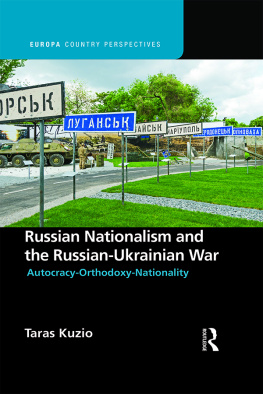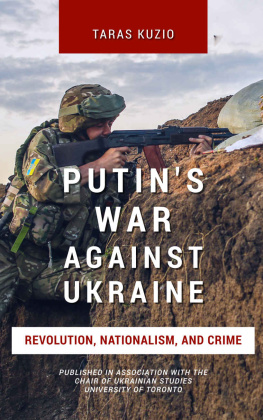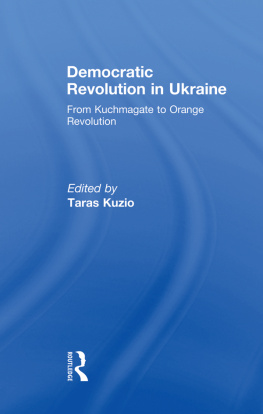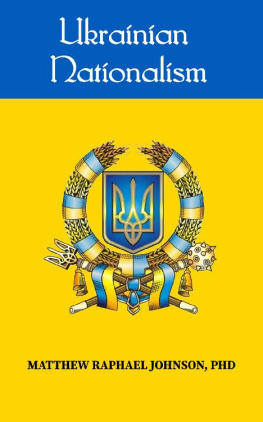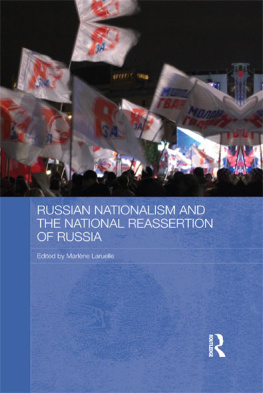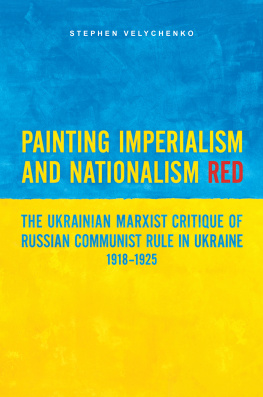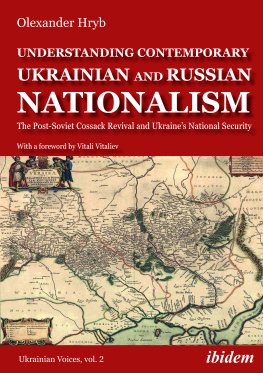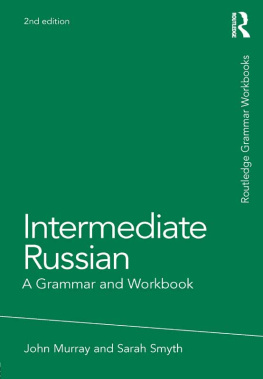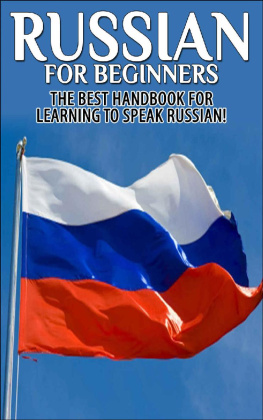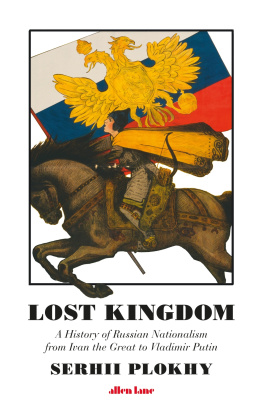Russian Nationalism and the Russian-Ukrainian War
This book is the first to provide an in-depth understanding of the 2014 crisis, Russias annexation of Crimea and Europes de facto war between Russia and Ukraine. The book provides a historical and contemporary understanding behind President Vladimir Putin Russias obsession with Ukraine and why Western opprobrium and sanctions have not deterred Russian military aggression.
The volume provides a wealth of detail about the inability of Russia, from the time of the Tsarist Empire, throughout the era of the Union of Soviet Socialist Republics (USSR), and since the dissolution of the latter in 1991, to accept Ukraine as an independent country and Ukrainians as a people distinct and separate from Russians. The book highlights the sources of this lack of acceptance in aspects of Russian national identity. In the Soviet period, Russians principally identified themselves not with the Russian Soviet Federative Republic, but rather with the USSR as a whole. Attempts in the 1990s to forge a post-imperial Russian civic identity grounded in the newly independent Russian Federation were unpopular, and notions of a far larger Russian imagined community came to the fore. A post-Soviet integration of Tsarist Russian great power nationalism and White Russian migr chauvinism had already transformed and hardened Russian denial of the existence of Ukraine and Ukrainians as a people, even prior to the 2014 crises in Crimea and the Donbas. Bringing an end to both the Russian occupation of Crimea and to the broader RussianUkrainian conflict can be expected to meet obstacles not only from the Russian de facto President-for-life, Vladimir Putin, but also from how Russia perceives its national identity.
Taras Kuzio is an Associate Research Fellow at the Henry Jackson Society think tank in London, UK and Professor in the Department of Political Science, National University of Kyiv Mohyla Academy, Ukraine. He is the author, co-author, editor and co-editor of 21 books, including Ukraines Outpost: Dnipropetrovsk and the Russian-Ukrainian War (2021, co-editor), Crisis in Russian Studies? Nationalism (Imperialism), Racism and War (2020), The Sources of Russias Great Power Politics: Ukraine and the Challenge to the European Order (2018, coauthor), Putins War Against Ukraine: Revolution, Nationalism, and Crime (2017). He is the author of five think tank monographs, including The Crimea: Europes Next Flashpoint? (2010) and is also a member of the editorial boards of Demokratizatsiya, Communist and Post-Communist Studies, Eurasian Geography and Economics, Central and European Migration Review, and The Ukrainian Quarterly. He has authored 38 book chapters and over 130 scholarly articles on Ukrainian and Eurasian politics, democratic transitions, colour revolutions, nationalism, and European studies.
Europa Country Perspectives
The Europa Country Perspectives series, from Routledge, examines a wide range of contemporary political, economic, developmental and social issues from areas around the world. Complementing the Europa Regional Surveys of the World series, Europa Country Perspectives is a valuable resource for academics, students, researchers, policymakers, business people and anyone with an interest in current world affairs.
While the Europa World Year Book and its associated Regional Surveys inform on and analyse contemporary economic, political and social developments at the national and regional level, Country Perspectives provide indepth, country-specific volumes written or edited by specialists in their field, delving into a countrys particular situation. Volumes in the series are not constrained by any particular template, but may explore a countrys recent political, economic, international relations, social, defence, or other issues in order to increase understanding.
Greece in the 21st Century
The Politics and Economics of a Crisis
Edited by Constantine Dimoulas and Vassilis K. Fouskas
The Basque Contention
Ethnicity, Politics, Violence
Ludger Mees
Barcelona, the Left and the Independence Movement in Catalonia
Richard Gillespie
Political Party Dynamics and Democracy in Sweden
Developments since the Golden Age
Tommy Mller
Territorial Politics and the Party System in Spain
Continuity and Change since the Financial Crisis
Caroline Gray
Russian Nationalism and the Russian-Ukrainian War
Autocracy-Orthodoxy-Nationality
Taras Kuzio
For more information about this series, please visit: www.routledge.com/Europa-Country-Perspectives/book-series/ECP.
First published 2022
by Routledge
2 Park Square, Milton Park, Abingdon, Oxon OX14 4RN
and by Routledge
605 Third Avenue, New York, NY 10158
Routledge is an imprint of the Taylor & Francis Group, an informa business
2022 Taras Kuzio
The right of Taras Kuzio to be identified as author of this work has been asserted in accordance with sections 77 and 78 of the Copyright, Designs and Patents Act 1988.
All rights reserved. No part of this book may be reprinted or reproduced or utilised in any form or by any electronic, mechanical, or other means, now known or hereafter invented, including photocopying and recording, or in any information storage or retrieval system, without permission in writing from the publishers.
Trademark notice: Product or corporate names may be trademarks or registered trademarks, and are used only for identification and explanation without intent to infringe.
British Library Cataloguing-in-Publication Data
A catalogue record for this book is available from the British Library
Library of Congress Cataloging-in-Publication Data
A catalog record has been requested for this book
ISBN: 978-1-032-04317-3 (hbk)
ISBN: 978-1-032-04320-3 (pbk)
ISBN: 978-1-003-19143-8 (ebk)
DOI: 10.4324/9781003191438
It appears, and this is highly regrettable, that Ukraine is being turned, slowly but steadily, into an antipode of Russia, an anti-Russia, a territory from which, judging by all appearances, we will never stop receiving news that need to be given special attention in terms of protecting the national security of the Russian Federation.
President Vladimir Putin to the UN Security Council, 14 May 2021 http://www.en.kremlin.ru/events/president/news/65572
The current president of this tortured country [Ukraine] is a person with certain [Jewish] ethnic roots, who spoke Russian all his life. Moreover, he worked in Russia and received significant profits from his Russian business activities. Nevertheless, at a certain moment, having become head of state, from fear of provoking another Maidan against his personal power, he completely changed his political and moral orientation. In fact, he renounced his identity. He [Volodymyr Zelenskyy] began to earnestly serve the most rabid nationalist forces in Ukraine
This is reminiscent of the ludicrous situation where members of the Jewish intelligentsia in Nazi Germany, for ideological reasons, would be asked to serve in the SS Therefore, he shows himself to be more of a nationalist than the most radical of them
The current generation of Ukrainian leaders are very dependent people. Much has already been said and written about this, including in the well-known [July 2021] article by Vladimir V. Putin. The country [Ukraine] is under direct foreign control. Ukraine is completely dependent upon cash injections into its economy from handouts given by the United States and the EU and direct management of the Ukrainian secret services by their American patrons. It therefore makes no sense for us [Russia] to deal with these vassals [Ukraine]. The business [of Ukraine] must be dealt with through its overlord [USA].

